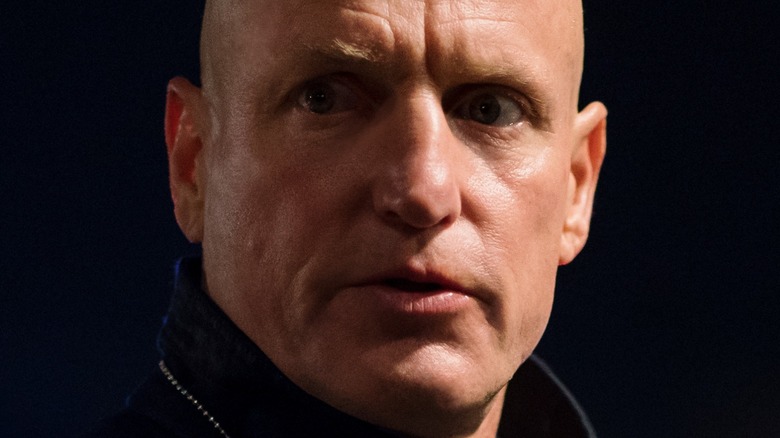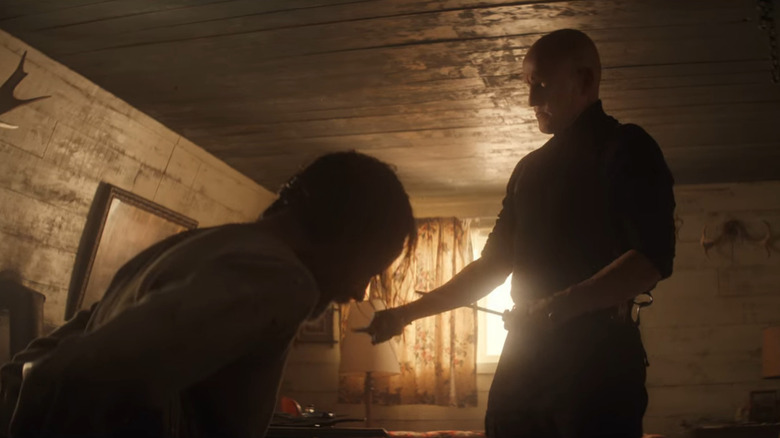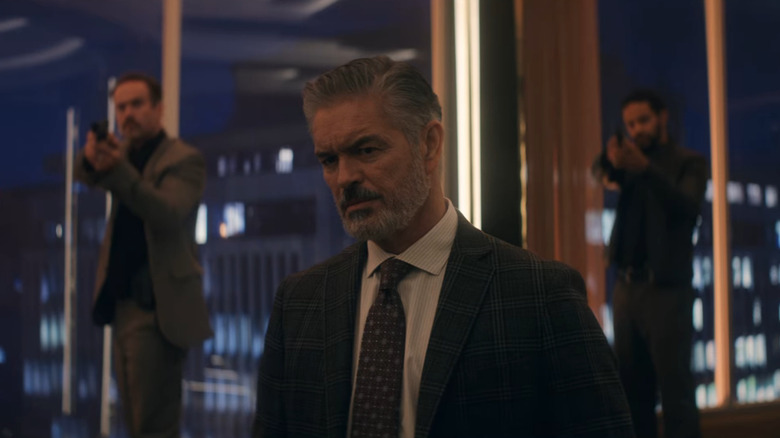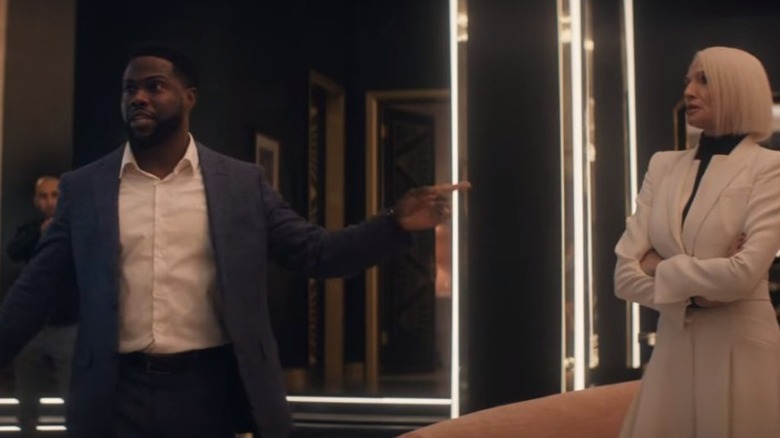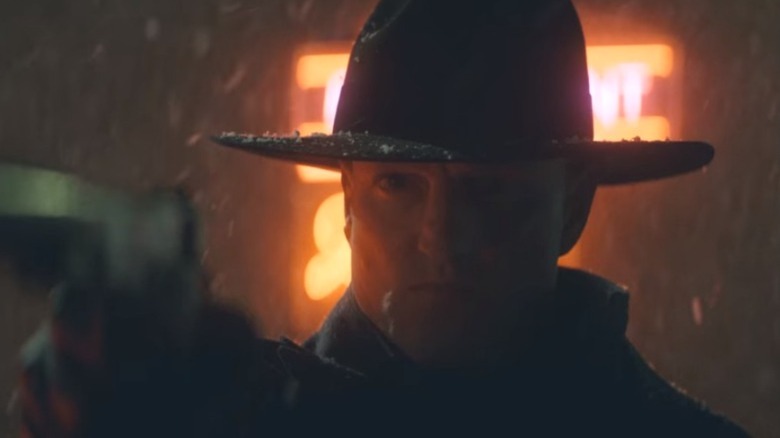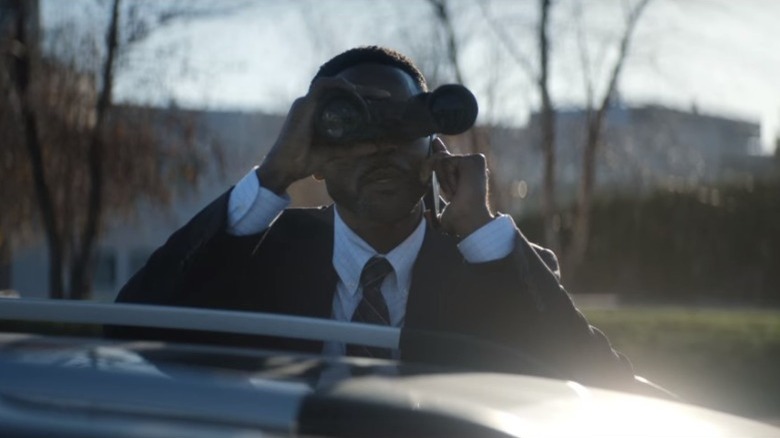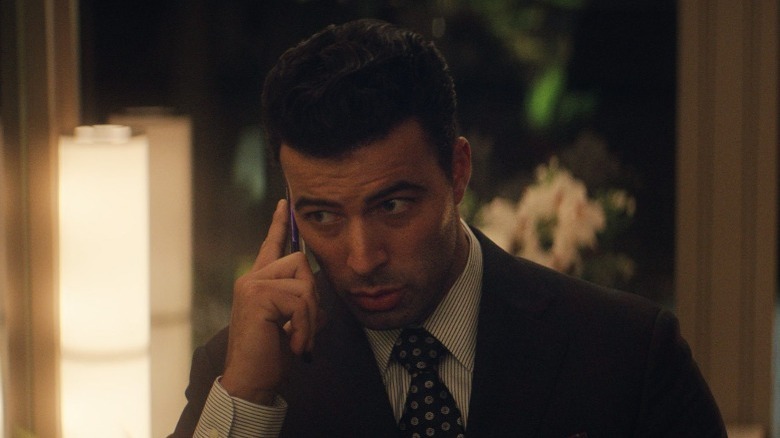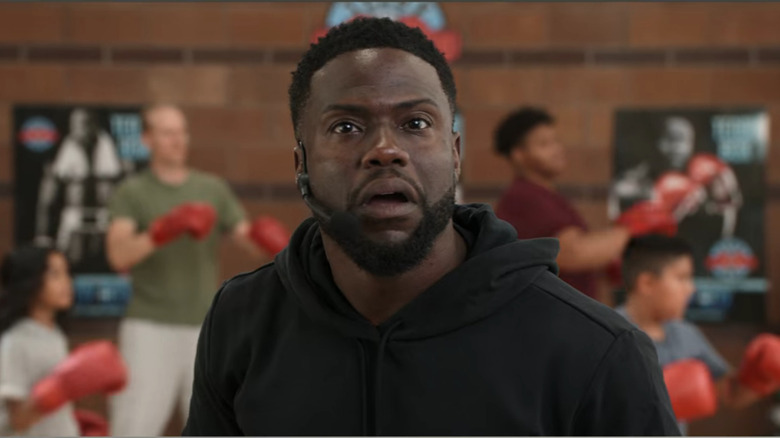The Ending Of The Man From Toronto Explained
Nobody is expecting action movies to make much sense. Bond movies take place in a sleepy, incomprehensible timeline that feels like a dream punctuated by poker and doomsday devices. Marvel movies wander from quips to CGI energy-beam fights and assume you've done the homework yourself on the rest of their universe. But even for the lower bar that action movies have to clear, Netflix's recent "The Man From Toronto" feels like a movie made assuming viewers are idly scrolling their phones while watching: It does the barest work to justify its central mistaken identity premise and then waltzes from city to city without any real sense of stakes or logic.
Nonetheless, "The Man From Toronto" offers some decent buddy comedy laughs due to the pairing of the motor-mouthed Kevin Hart and the reliably glowering Woody Harrelson (who stepped in after Jason Statham abruptly quit right before filming). Director Patrick Hughes of "The Hitman's Bodyguard" redeems himself in the final sequence with a lengthy and kinetic one-take brawl, and as the credits roll you might think, "That movie wasn't half as bad as its dreadful reviews, but what exactly happened again?" As it turns out, there were some subtle parts of the film that take on deeper meaning upon closer inspection, along with a fair amount that the movie could have made clearer to begin with. This is the ending of "The Man from Toronto," explained.
Torture: apparently scarier in theory than in practice
The first thing you should know about Woody Harrelson's titular Man from Toronto (hereafter referred to as "Toronto"), is that he's so good at torturing people that he never actually has to do it. We see this in the opening scene, when he intimidates a captive man, who even has French military training to resist interrogation, into coughing up the goods simply by telling a story while brandishing a collection of knives. Granted, it's a grim story about his own grandfather's death via grizzly bear, but it's an anticlimactic result after a lot of buildup.
Toronto's reputation apparently precedes him so thoroughly that it also seemingly explains why Teddy (Kevin Hart), a perpetual screw-up who's clearly scared out of his mind, successfully interrogates more than one person when he's posing as Toronto and failing wildly at the impersonation. Everyone seems ready to assume that Teddy's outsized behavior and verbal tics are all part of his method. It's one of the many parts of "The Man from Toronto" that you just sort of have to accept: Not only is torture 100% reliable in this world (which we know not to be the case), but it's also so scary that even trained professionals and shady career criminals would rather talk than even let it begin.
Do people really print things anymore?
The central mix-up in "The Man from Toronto" requires you to buy into two unrealistic premises. First, you have to believe that any of the nefarious types Teddy encounters would buy that he's a cold-blooded assassin worth $2 million per job. Second, you have to just roll with Teddy printing out the address of his vacation cabin in Onancock and arriving at the wrong one because of a "low toner" issue. When was the last time anyone went anywhere without just putting the address into their phone? Even though Teddy also antiquatedly uses Hotmail, surely he can check that on his phone and verify the address?
Truthfully, it would even be worth setting the movie in the mid-2000s heyday of printing out MapQuest directions and hoping that you don't get lost. That would also help justify how not replacing the printer toner becomes an actual point of contention in Teddy's marriage to Lori (Jasmine Mathews). Everyone's household needs are different, but in the digital times we live in printer toner just isn't the precious commodity that it once was. "The Man from Toronto" is so proud of the "low toner" gag that it makes a callback to it at the very end of the movie, which just reminds us how the basic premise of the movie is contrived in both directions.
What did the Venezuelan colonel want again?
It's very easy to forget entirely about the ostensible villain of "The Man from Toronto," the Venezuelan Colonel Marin (Alejandro de Hoyos). He's mentioned briefly in the beginning and only appears in the big showdown at the hotel. He allegedly took part in an attempted coup that was foiled by U.S. intelligence services, and now he wants to finish the job, using a new seismic weapon to blow up the Venezuelan President at the opening of their country's new U.S. Embassy.
Fair enough. Like many elements of the plot, it pulls at several threads that the movie is not prepared to unravel. Shouldn't the CIA be involved in addition to the FBI in the effort to stop this plot, as it's clearly an international issue? And does the attempted coup have anything to do with the real-life Venezuelan presidential crisis, which the U.S. had tangential involvement with, but it feels more like the writers of "The Man from Toronto" threw a dart at a map of South America.
Teddy's big stalling tactic
In a somewhat showstopping scene at the hotel, Teddy goes on a long, nonsensical rant claiming for one final time to be the real Man from Toronto, and that Toronto is actually just his driver and middleman. Nobody really seems to buy it, least of all Toronto's point of contact, the Handler (Ellen Barkin), but it certainly wastes enough time for the FBI to raid the hotel suite and put a stop to Marin's plan. It's not clear from the dialogue on the way, but it seems like this was Teddy's plan all along. As the audience, we've been privy to the FBI monitoring his and Toronto's movements this whole time, but it's unclear how Teddy knew they would swoop in to save the day. As far as he knows, they've been out of contact with him since before he got on the plane to Puerto Rico!
Moreover, it seems unlikely that Teddy discussed this plan with Toronto himself, who as a known assassin and torturer, would not be particularly chill about the FBI being involved in the plan. Like many scenes in the movie, it all just kind of works out okay for everyone involved: Toronto gets away with the money, the Handler escapes to cause more trouble, and the FBI very nicely gives Teddy a ride back to the restaurant to try and catch Lori instead of even questioning him about what he's been up to.
The wrong thumb on the scale
After the general chaos at the hotel, there's a surprise twist: The thumb that Marin needed to activate the seismic weapon wasn't even the right one. True to his late-breaking moral conscience, Toronto cut off the thumb of a random thug in Puerto Rico instead of the "Mr. Green" whose thumbprint was a failsafe to activate the device. It's a heartening bit of information for Teddy to learn, as it proves that he's having a good influence on his previously sociopathic new friend.
But in another way, it also means that Toronto just took Teddy on yet another potentially fatal adventure to the hotel suite for absolutely no reason. It seems like they've decided to stop Marin's plan and do the "right thing," but the thumb reveal means that Toronto knew the weapon wouldn't have worked anyway, so he was just there to collect the $2 million fee that he was promised for delivery of the code and the thumb. Either Teddy never quite puts this together or he moves on from it quickly and focuses on the positive part of the situation. As viewers, we realize only that the majority of the previous scene was pointless.
Assassins have their own private MySpace?
Everything about the Handler is a sort of fascinating mystery. It's not clear if her network of one unique, terrifying assassin in each major city is answerable to her alone or part of some larger organization, though she does rather proudly refer to the Man from Miami (Pierson Fodé) as "one of mine." She seemingly operates as the sole point of contact for potentially hundreds of assassins, but we have no inkling of how each "Man from" is recruited or vetted. What's stranger still is that each of them seems to be aware of the others by reputation, as Toronto seems to recognize all of his counterparts in the melee at the end.
The strangest detail is the implication that Toronto is the only one of her contractors whose face is unknown to her. Teddy is at least briefly able to cast doubt into her mind about Toronto's true identity, but one scene later she's browsing through a very Facebook- or MySpace-like website with all of her assassins listed, each of whom has an Ultra-HD profile picture of their clearly visible face.
The vengeful Handler really wanted that $2 million
It seems hard to believe the Handler, as the overseer of a vast criminal network, would be so hard up for the $2 million fee that Toronto swiped that she would send so many assassins after Teddy. Even if she were successful, you have to assume paying so many other Men from Cities would make the whole endeavor a wash. And that's before you tally up the cost of grenade launcher ammo and the risk of so much collateral damage all over Yorktown. It's worth it to see Ellen Barkin laying waste to an entire parking lot, but that doesn't make it sensible based on what we know of the Handler.
Clearly, it's personal between her and Toronto, but the movie is sorely lacking in providing any emotional context that makes that betrayal stick so severely in the Handler's craw. It seems like a mathematical certainty that if you employ a lot of assassins for a lengthy amount of time, one of them is bound to grow a conscience and gum up the works at some point. It's a mystery how the Handler made it as far as she did letting her temper get the best of her.
A change of heart in Minnesota
Though he's presented as a torture specialist with an icy demeanor whom we witness kill several people without flinching, Toronto is revealed to have been wrestling with a newfound sense of morality the entire time. He reveals to Teddy that a job in Minnesota to take out a degenerate gambler caused him to hesitate when he ran into many an assassin's Achilles heel: an innocent child as a witness. He decided not to pull the trigger.
As Teddy correctly guesses, the child reminded Toronto of his own childhood tragedy: witnessing his grandfather mauled to death by a grizzly bear. Toronto wanted to "break the cycle" of violence in turn. Somewhat confusingly, Toronto reveals that the man he spared would later go on a rampage and even told Toronto he would go on a rampage if spared, which really muddles the supposed clarity of the moral epiphany. But by some combination of this Minnesotan child's innocence and Teddy's humanizing influence, Toronto finds his own heart in the end.
Your tax dollars at work
Truly mind-boggling is the depiction of the Federal Bureau of Investigation in "The Man from Toronto." Of all the people that kind of just roll with Teddy impersonating the Man from Toronto, it's actually the FBI's idea for him to keep doing so in the first place after the initial mix-up at the cabin. This is apparently the best strategy they can think of moving forward, to rely on an unemployed internet fitness entrepreneur against his own very loud protests? This is only after they raided the cabin too late to prevent the death of the first hostage, or the relay of his vital information to Marin.
They also immediately lose track of Teddy as soon as the "operation" starts, helplessly watching as he's whisked off to Puerto Rico. They generally seem to let Teddy and Toronto come and go as they please and always operate a step behind the action like the police in "Fargo," except for the very end, when they manage to swoop in and prevent Marin's evil plan as a deus ex machina. It wouldn't take many tweaks to the screenplay of "The Man from Toronto" to remove the FBI's passive role entirely and just come up with a reason for Toronto to need Teddy around on his own. It certainly doesn't work well as a recruitment ad — join the FBI if you love just kind of winging it!
What was Agent Santoro's deal?
The most competent FBI agent is the spectacularly odd Agent Santoro (Jencarlos Canela), who ends up minding Lori for the entire movie, much to Teddy's jealous dismay. So many questions — why does the FBI have an agent skilled in both Swedish and deep tissue massage at the ready? Does ballroom dancing come up a lot in domestic security work? Does the FBI often find itself in the position of needing to distract the wife of a helpless patsy? Do they throw a lot of birthday weekends with national security-related implications?
It seems like there are some deleted scenes with Santoro missing from "The Man from Toronto," as he gives a short speech to Teddy about how lucky he is at the end of the movie, seemingly having developed deep feelings for Lori in just a couple of days. Of all the potential spinoffs the movie could have, the suave romantic escapades of FBI Agent Santoro might be the strangest but most intriguing possibility. (Director Patrick Hughes already teased in an interview with The Illuminerdi that he'd love to do a crossover with his "Hitman's Bodyguard" series.)
What did Lori want to see from Teddy?
For all the plot machinations devoted to Teddy and Lori's marriage, deceiving her into believing Teddy has a work presentation and explaining Santoro's inexplicable presence, hardly any dialogue is devoted to the emotional texture of their relationship. It's clear that Teddy's continual screw-ups, from his failed business ventures to the conspicuous lack of toner, have taken their toll. But we never get a real sense of either what drew Lori to Teddy in the first place or what she wants to see from him moving forward.
The scene at the train station sets us up to expect a monologue of at least a little depth from Teddy to win her back, perhaps with a new and confident verve that he's picked up from his recent death-defying adventures, but he just says vaguely that she's all he needs, and she seems ready to forgive him for everything. They're comically interrupted when Toronto's car gets hit by a train, and then the movie cuts to a year later, when a successful Teddy and a pregnant Lori are all smiles. "The Man from Toronto" wants us to root for a relationship it doesn't bother to define or depict.
No-contact boxing finally takes off
The credits of "The Man from Toronto" reveal that at last, Teddy's "no-contact boxing" idea has finally taken off. He has his own gym and a successful livestream with 5,000 viewers, implying that all he really needed was to commit to an idea and see it through to succeed instead of pivoting so frequently like in the movie's beginning. It's arguably the only element of the movie's plot that comes full circle in a meaningful way, although just like with his marriage, Teddy has accomplished all of this in the span of the abrupt cut to "one year later."
Except this already exists, more or less. Nineties kids might remember a similar idea to Teddy's that was a successful proof of concept, Billy Blanks' Tae Bo workout that also involved lots of punching the air in front of you. By 1999, Tae Bo had sold millions of videotapes and ran a hugely successful series of infomercials. Hopefully, Teddy's future as a fitness guru is equally bright.
